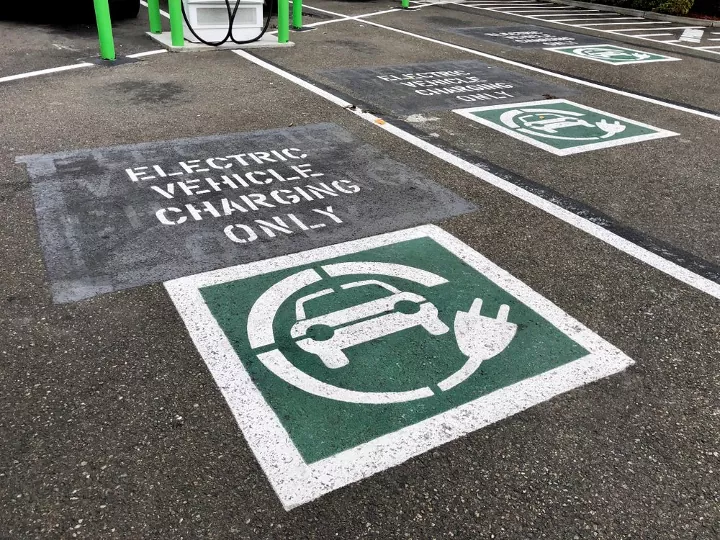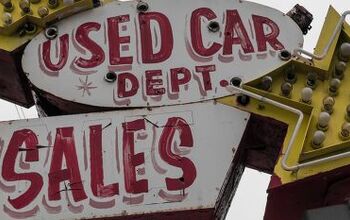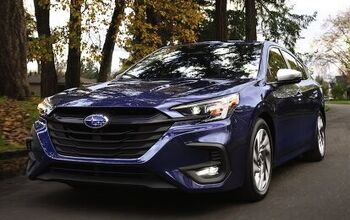Survey Shows Auto Dealers Still Annoyed With Biden EV Strategy

A recent survey, conducted by Automotive News, has indicated that automotive dealerships are still broadly dissatisfied with the Biden administration’s strategy to force the United States to pivot toward all-electric vehicles. According to the 2024 Dealer Outlook Survey, 83 percent of respondents said the government was pushing the transition toward EVs too quickly and mucking up the auto market.
The survey incorporated answers from 208 dealers and dealership managers and the majority agreed that the Biden administration had negatively affected their businesses in 2023. Roughly 55 percent also agreed that having EVs on the lot were actually generating negative interest in the lineup.
"Our roads and electric grid, let alone consumers, just aren't ready as fast as the current administration wants," explained one respondent.
Others likewise said that it should be the market driving EV sales, not pressure from the government.
From Automotive News:
A top concern was the EPA's proposed limits on vehicle tailpipe pollution for 2027-32 model-year cars and light trucks — a regulatory move that, if finalized, could result in battery-electric vehicles making up two-thirds of new-vehicle sales by 2032, according to the agency's projections.
Thousands of dealerships have urged President Joe Biden to reconsider the proposal — which could be finalized as soon as March — arguing it would mandate an unrealistic shift to solely battery-powered vehicles before the market and infrastructure are ready.
"Electric vehicles are exciting. They're definitely overall a good impact for our customers and for the environment, but it's moving too fast," said Michael Lucki, general manager of Riverhead Mazda in New York. "It should be driven by consumer demand, and consumer demand isn't there yet."
The collective dismay was probably best reflected in the question: “Is the Biden administration pushing the industry to move too fast on EVs?”
That query saw an overwhelming majority (83 percent) say yes. Only 8 percent of respondents said no, with 9 percent claiming they were unsure. About half of all dealerships also said they never bothered to register with the IRS to more easily facilitate EV tax credit exchanges. However, about half of those said they at least planned to in the future so customers could get their government refund immediately.
While the Biden administration has a stated goal of seeing half of all new vehicle sales by electric by 2030, it’s technically prohibited from issuing formal mandates requiring what people can use their money to buy. However, it can encourage federal regulators to implement policies so rigid that the industry is required to build EVs in greater numbers and that has been its preferred tactic.
As you undoubtedly know, the automotive sector has spent the last few years patting itself on the back for going along with the scheme and similar programs implemented in Europe. Electric automobiles have, for whatever reason, been framed as a moral good by both industrial and government actors. But the public has remained broadly hesitant to climb aboard the bandwagon as the downsides of EV manufacturing became more apparent.
The industry has likewise had trouble fielding electric vehicles with broad appeal. Luxury-minded electrics are simply too expensive for most people to afford and the more pedestrian models have been seen in the news for battery fires and botched product launches. Some of that is undoubtedly the result of the media landscape trying to draw in eyes. But it’s being reflected in slowing sales, as the electrified segment looks to be approaching market saturation.
That said, sales volumes haven't been great in general and quality control looks to have gone down across the board since 2019. Combustion and electrified vehicles have both seen a drop in consumer satisfaction. Meanwhile, inflationary pressures, caused by excessive government spending and plain-old corporate greed, are forcing average buyers downmarket.
As for dealers, there’s some amount of disagreement as to what’s holding EVs back. Some have argued it’s simply a lack of infrastructure, while others have claimed battery driven vehicles simply don’t work as well for the typical customer. Many stores also don’t want to shell out large sums to refit their facilities in the manner some automakers claim would be mandatory if they want proper EV allocation.
Rising MSRPs were also a concern, with many noting EVs tend to trade at prices far higher than their combustion-driven counterparts and are likewise worse at holding their resale value. That issue was exacerbated by provisions (e.g. Section 30D) issued by the federal government designed to help localize electric vehicle production and ensure wealthy shoppers (who tend to buy more EVs) weren’t being overly advantaged. There are ironically fewer vehicles that actually qualify for government subsidies now than when the U.S. still used production quotas.
"EVs are definitely not a want of our guests today. Who's going to pay that kind of money for that type of vehicle when the infrastructure isn't available?" stated Mike Aus, dealer principal of Durango Motor, which sells Ford, Lincoln, Kia and Toyota vehicles out of Colorado. "Until the prices of them come in line with normalcy, they're going to continue to sit there."
[Image: ZikG/Shutterstock]
Become a TTAC insider. Get the latest news, features, TTAC takes, and everything else that gets to the truth about cars first by subscribing to our newsletter.

A staunch consumer advocate tracking industry trends and regulation. Before joining TTAC, Matt spent a decade working for marketing and research firms based in NYC. Clients included several of the world’s largest automakers, global tire brands, and aftermarket part suppliers. Dissatisfied with the corporate world and resentful of having to wear suits everyday, he pivoted to writing about cars. Since then, that man has become an ardent supporter of the right-to-repair movement, been interviewed on the auto industry by national radio broadcasts, driven more rental cars than anyone ever should, participated in amateur rallying events, and received the requisite minimum training as sanctioned by the SCCA. Handy with a wrench, Matt grew up surrounded by Detroit auto workers and managed to get a pizza delivery job before he was legally eligible. He later found himself driving box trucks through Manhattan, guaranteeing future sympathy for actual truckers. He continues to conduct research pertaining to the automotive sector as an independent contractor and has since moved back to his native Michigan, closer to where the cars are born. A contrarian, Matt claims to prefer understeer — stating that front and all-wheel drive vehicles cater best to his driving style.
More by Matt Posky
Latest Car Reviews
Read moreLatest Product Reviews
Read moreRecent Comments
- Fred No idea why someone would interested in buying this at the price point. I'm pro-ev but a quick search can pull-up a lot more value at lower costs. I like the Fiat design but I couldn't stomach paying $37k for limited range and a super tight back seat.
- 28-Cars-Later For the you-gotta-be-rich-to-afford-a-cheap-car crowd, Versa is the winner here IMO. Buy it new and pay the $300ish (?) note, but enjoy at least five years with relative reliability assuming historical average miles. Based on MY19, Manheim expects the "S" to be worth $5,975 in roughly five years with "retail" value being $12,650. Nissan and other second or third tier marques will give more on a new trade so assuming 20 OTD with incentives its a 12K/$2,400 depreciation over 5 years excluding interest and it probably could be kept another year or two before the Nissan in it starts to show. Mirage in this comparison is the new buy used on the cheap and run it till the wheels fall off. I'm loathe to compare it to either the Panther or 240 (since I don't believe it could physically last as long as either) but something in the vein of car you could repair yourself on the cheap which was originally intended for Third World conditions. Based on MY19, the ES hatch is worth $4K even with avg miles of 72,740 and "retail" value at $9,650. I personally see it as lot poison and could see savvy buyers making off with one of these near or below wholesale while Nissan is a staple of the subprime crowd and is much easier to finance. MC beings up an interesting contender in the used Chevy Bolt, whose wholesale is $12,050 for MY19 in LT trim with avg lower miles of 33,017. While this is very intriguing, financing is going to be the story here since Nissan or I imagine Mitsubishi could put buyers into half decent rates despite poor credit where a Bolt is "going to the street" and getting whatever high rate is being offered now. Assuming one can handle their own charging, Bolt does offer a lower maintenance cost and used I believe buyers have a higher chance of a white collar professional's commuter condition than what they will find in a used Nissan or Mitsu runabout. The risk to our theoretical buyer IMO is that the Bolt will straight up fail at some point in the future, either not take a charge or even turn on and for the higher wholesale entry point I say the Mitsu is a better choice since it likely won't completely fail and can very cheaply be replaced. Additional: For your kid/nephew/niece/any "middle class" child, I think Bolt is probably the better proposition here but I'd be out of the trade in 36 mos personally. For those truly on their own with no emergency support system, I'd shy away.
- Jbltg It's interesting to note that in the Japan domestic market, where cars are built to order and dealers maintain barely any stock, that there are many, many color options. Really good ones, but no one seems to bite. Most of the cars on the road there are the same boring colors that we have. Go figure.My pet peeve is black interiors. Too depressing, and shows every speck of dust and dirt.
- IBx1 Dealerships flood the market with grayscale cars to commodify them and drive down resale value. Green and yellow cars hold their value best because they cannot easily be replaced, but you can throw a rock and hit fifty shades of gray.
- SCE to AUX Appliances (household and vehicular) have limited color choices, that's why.But today, if you want a crazy color, just buy a plain one and get it wrapped.


































Comments
Join the conversation
"They should first electrify that border wall."
I kinda got a chuckle out of that meme.
if it were up to the luddites we'd still ;;;
have leaded gas
no seat belt laws
smoke on airplanes
don't let women vote
as it is dealerships and 'top salespeople' are the literal scum of the earth so NFG, go cry all you want dealers ...